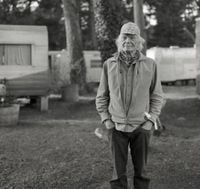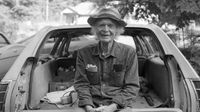Michael Hurley, the beloved eccentric folk singer whose music became a touchstone for a generation of singer-songwriters, has died at 83. The singer’s death was announced in a statement from his family, and his publicist confirmed that Hurley died in his home state of Oregon after returning home from a series of weekend performances at the Big Ears festival in Knoxville. A cause of death was not provided.
“It is with a resounding sadness that the Hurley family announces the recent sudden passing of the inimitable Michael Hurley,” the statement reads. “The ‘Godfather of freak folk’ was for a prolific half-century the purveyor of an eccentric genius and compassionate wit. He alone was Snock. There is no other. Friends, family, and the music community deeply mourn his loss.”
Michael Hurley was known for singing and writing songs that were delivered warmly and plainly, often in a lo-fi presentation, about unconventional subject material. Put more simply, he sang and wrote songs that sounded like they couldn’t have been written or sung by anyone other than Michael Hurley, songs about fishbones and biscuit rollers and werewolves and forsaken hogs. Over the past quarter-century, those songs and the one-of-a-kind spirit that produced them became a guiding beacon of artistic integrity and inspiring non-conformity. They inspired everyone from indie legends like Cat Power and Will Oldham to roots luminaries like Lucinda Williams to roots rockers Deer Tick to next-generation oddballs like Jonny Fritz, a singer who wouldn’t exist without the path Michael Hurley blazed decades prior.
Born in Bucks County, Pennsylvania, Hurley moved around as a child, traveling to Florida and California due to his father’s work as a producer of musicals, before settling back in Pennsylvania. Music came to him at a young age, as he absorbed R&B, blues, and rock and roll records as a child. Before long, Hurley began writing his own songs. “I started making up stuff right away,” Hurley told the New York Times in 2021. “If you don’t know the proper way, you do it your way. Sometimes, that gives you a better song.”
As a teenager, Hurley began hitch-hiking and traveling across the country, eventually finding himself in Greenwich Village. At 22, he recorded his debut album First Songs, which was released in 1964 by Smithsonian Folkways. His second release was 1971’s Armchair Boogie, which featured his signature songs like “Be Kind to Me” and “Sweedeedee.” “Michael Hurley is either a stone genius or he is stone crazy,” Rolling Stone’s review of the album said. “I suspect he is both.”
A few years later, Hurley played a part in a record that became his most influential and well-known work. The album was called Have Moicy, credited to the Holy Modal Rounders. Although the bulk of the record was recorded by just two bandmates (including Peter Stampfel), Hurley and many others contributed to the album, which soon became a cult-classic. In his A+ review, the critic Robert Christgau raved that the record “renew[ed] the concept of American folk music as a bizarre apotheosis of the post-hippie estate.”
In the eighties, he established his own label, Bellemeade Phonics, which he used to release his own records until the early 2000s, when a series of indie labels began releasing his music. At that point, Hurley had settled in the Pacific Northwest, where he’d been anointed as a sort of king of nonconformist singer-songwriters to a younger generation. “The refrain,” Will Oldham, one of those songwriters, told the Times in 2021, “is, ‘What would Michael Hurley do?’”
Michael Hurley remained active as a recording and touring artist in his final years. His last new album of entirely new material is 2021’s The Time of the Foxgloves. In 2021, Hurley was asked to name his all-time favorite albums. His response was, instead, a personal manifesto: “I like original music,” Hurley said. “I like to listen to people who are playing themselves, not somebody else or who they think they should be. I like a raw truth. I like to celebrate the hilarity of life. The whole deal. The boogie woogie, the bebop and the blues as well as folk music of all nations.”
Hurley’s impact on folk music is immeasurable, as his language touched five generations of storytellers. Recently, Merce Lemon named her album Watch Me Drive Them Dogs Wild after the retelling of a family friend’s encounter with Hurley, who howled from a living room and awoke a pack of dogs in the middle of the night. Recently, he played an at-capacity set at Big Ears Festival in Tennessee, surrounded by people who adored him. I can’t think of a better send-off for the one guy who could make the phrase “greatest of all time” sound very silly.
His final shows included a performance at the AyurPrana Listening Room in Asheville, North Carolina, on March 31, 2025, just days before his passing. Hurley is survived by five children: Jordan, Colorado, Daffodil, Rollin, and Wilder Mountain Honey. Upon learning of his death, numerous musicians have taken to social media to honor the late singer-songwriter, including the Walkmen’s Hamilton Leithauser, Ryley Walker, and More Eaze. “So long Val Kilmer and Michael Hurley,” Langhorne Slim wrote in an Instagram story. “Two giants of their craft. Both changed the way I saw things after experiencing their work. Both expanded my perception of art. Kings of cool. Rest in peace and thank you.”








